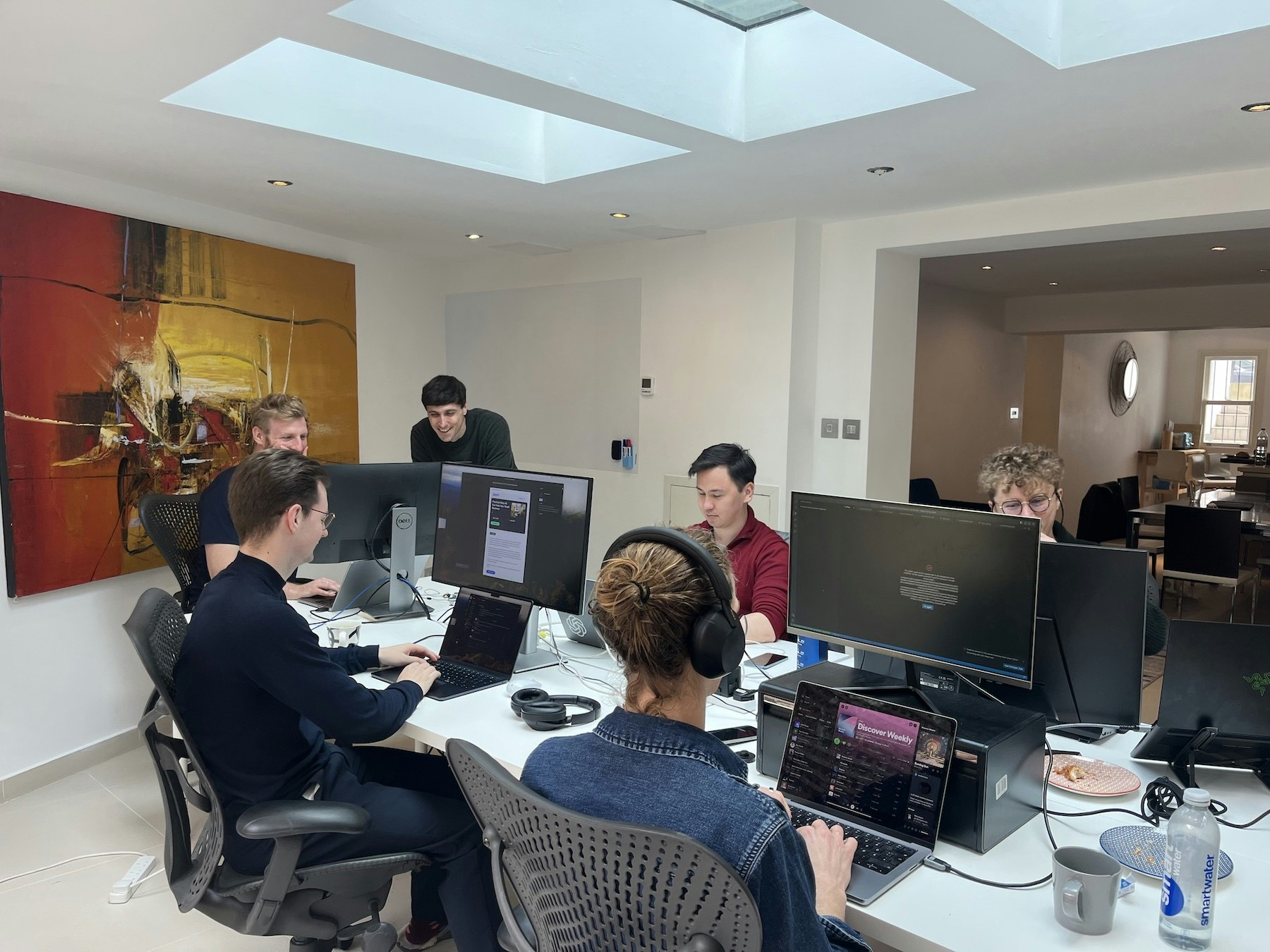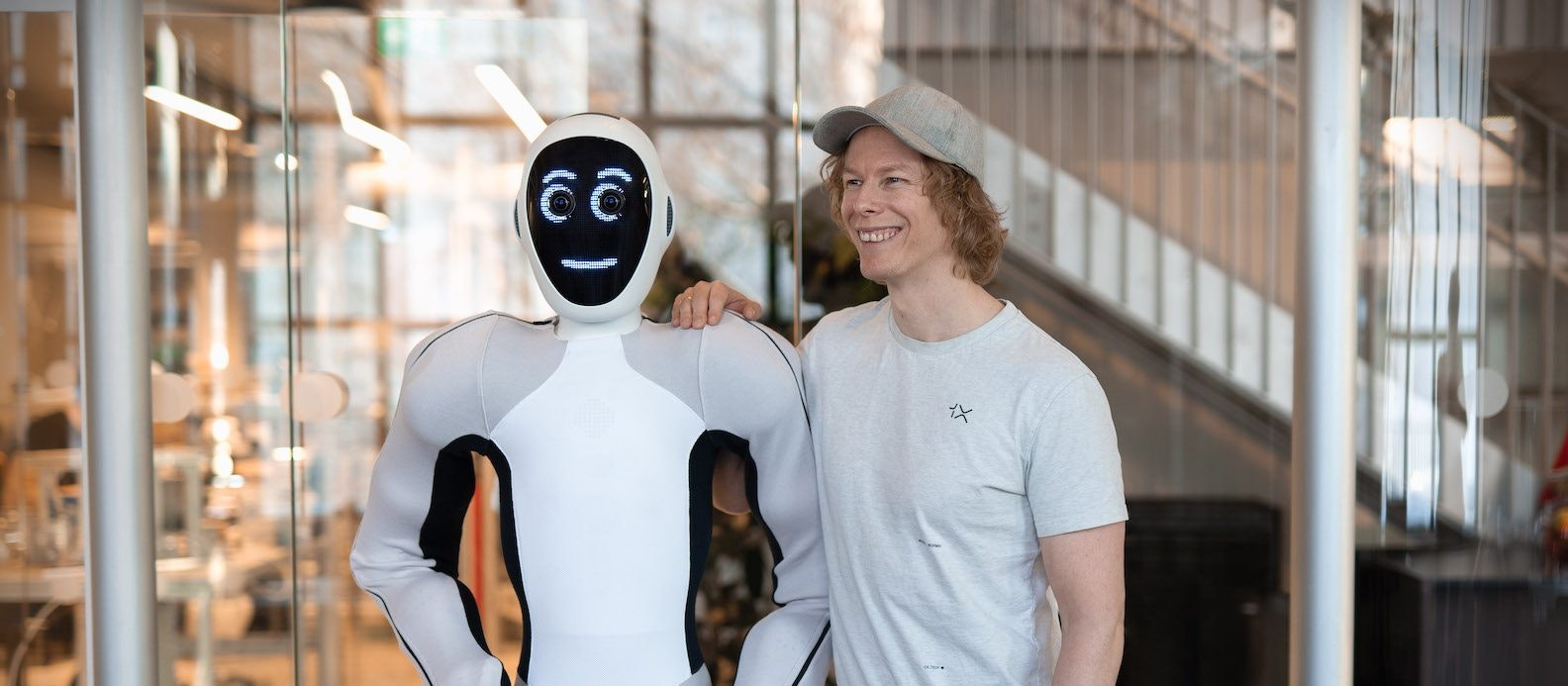In a leafy area of northwest London, the solid metal gate in front of the three-storey ‘founder mansion’ is ajar.
I leave the quiet street and enter the £8k-a-month house. A selection of pastries sits on the kitchen island, the patio doors to the garden are thrown open and on an otherwise sparse shelf sits an open box of Brewdog Punk IPA.
Throughout the morning, a steady stream of founders wander in for the coworking desks set up on the ground floor. I think I might have been the only visitor to knock at the door, rather than just let myself in.
Two of them, who seem to have just met, are chatting. “What will the world look like in 10 years if you’re successful?” one asks. People look up from their laptops to commend him on the interesting question, and it sparks a lively discussion.
Moments later, three of the house’s five flatmates gather, confused, around the fancy coffee machine trying to descale it for the first time since moving in together three weeks ago.
Welcome to London’s newest — and perhaps first — founder house, set up by 25-year-old Haz Hubble.
San Francisco energy
Across Silicon Valley, dedicated founders have been shacking up together for years, sharing equipment, ideas and dreams of startup success.
Now, the phenomenon has made its way to London. Hubble, founder of AI companion startup Pally, set up the house to fill a void.
“I spent a lot of time in San Francisco last year and experienced all of the amazing energy there. A lot of it is centred around people living together, working together, hanging out at each other's houses — it's such a community and I think that the UK needs more of that,” he says.
“We want to do everything we can to help everyone in London get more of that San Francisco energy. It shouldn't be the case that people leave London to go to San Francisco — London's a better city objectively!” he adds. “If we're just missing a few ecosystem things to make it on par, why can't we make those things happen here?”
With rooms in high demand, London’s landlords can afford to be picky — but this might be the first flatshare to ask that roomie has raised half a million in venture capital to be considered.
The advert for applications asked that “everyone has raised at least $500k for their current/previous startup, have sufficient runway, and are focused on growth. If you’re still ideating, or a first-time founder who hasn’t raised yet, this may not be for you yet (unless you’re super impressive).”
This criterion was to try and make sure all of the house’s inhabitants were able to support each other and find equal value in the flatshare. “What I think is really important is to have people at similar stages so that you can learn from one another,” “Hubble says. Otherwise, if you had one person who was super far ahead of everyone else, then that person maybe wouldn't get as much benefit as the others.”
After sifting through 30 applications (25 of which were from male founders), he selected his group of four fellow flatmates: Tom Hudson (32), Leander Maerkisch (27), Adrien Wald (25) and Moises Barbera Ramos (25). The response was so encouraging that he’s currently working on bringing several other founder houses together across London in the coming months.

Three weeks since move-in, there are coworking desks in the conservatory and garden, second screens dotted around and a fresh whiteboard up on the wall.
But some of the bedrooms are still a work in progress: Wald’s bed is missing everything but the frame, so he’s been sleeping on the sofa since moving in. Much to his relief, the mattress is delivered later that morning.
“The first thing we sorted was the office space,” says Hudson — only then did the sofa and other normal house furniture make it onto the shopping list.
But alongside being a space for these five founders to focus, the house is also hoping to be a “hub for startup activity” in London, says Hubble.
The flat hosts a regular Thursday night ‘family dinner’, poker nights with VCs in attendance and daytime coworking sessions for other entrepreneurs. The five roommates have plans to host bigger events in their balcony and garden space in the summer.
A home of healthy competition
Part of the appeal of the founder house is the motivation that a bit of healthy competition fosters, says Hubble.
“The people here don’t want a work-life balance,” he says — “we’re here to build something big. In the early days of Facebook or Nvidia, did the founders have balance? No.”
When it’s just the five flatmates in the house, a wall-mounted TV overlooking the coworking space usually displays a dashboard plotting the growth of each of their companies based on the metrics most important to them, like revenue or users.
This is not only a motivation tactic, but also a way to support each other: if someone’s growth is flatlining, the others will offer a helping hand. “We’re all here to see each other win,” says Hubble.
He specifically selected founders who are working on projects in different markets to avoid pitting competitors against each other. “It’s about accountability” rather than competition, adds Wald.
I don’t want boundaries. When you’re obsessed with a problem, it consumes your life.
To keep those growth lines up, the daily routines of the flatmates are full-on. Each aims to wake up by 8 am, hit the gym across the road and start the working day by around 9 am. When they sign off varies hugely. Adrien says he’ll log off at 7 pm at the earliest, Hubble will do a 10 am to 1 am day, Barbera Ramos says that he’ll stop “when I feel satisfied that we’ve done enough to move forward” and Hudson will push on “until I drop.”
It may sound like an intense way to live, but the inhabitants of this founder house knew what they were signing up for.
Hubble’s advert for the initiative detailed: “This is not for the weak. You will be pushed to be even better, to work harder, to grow faster. Together we will lift one another up, being the support system for a journey that is full of euphoric highs and devastating lows.”
And that’s partly what Maerkisch relocated to London from Germany for: “I don’t want boundaries. When you’re obsessed with a problem, it consumes your life. I wanted the experience of surrounding myself with things that inspire me.”
Finding your people
It isn’t just hard work, fun socials and pastries in the morning — for some of the flatmates, the founder mansion has provided a long-awaited space of acceptance.
“It’s a very lonely process, being a founder,” says Barbera Ramos. After struggles with his mental health, close brushes with burnout and a period of couch surfing without a permanent home, he’s been looking for somewhere to feel understood.
“It’s important to have a community around me,” he says, which he’s found thanks to the founder house. “I’m no longer alone.”
For others, it’s offered a whole new level of convenience. Wald was sleeping on the sofa of his cofounder’s flat before joining the house, and found hunting for a place to live an unnecessary distraction. “It felt more important to me to do my work rather than spend time finding flatmates and going through the arduous process of getting the lease” he says.
For Maerkisch, having a home and a networking space rolled into one has also reduced the hassle of socialising. “You don't need to get on a tube for half an hour to meet somebody,” he says. “This frictionless space is part of the appeal, you can really welcome amazing people around you.”
Even those who aren’t living in the flat say they’ve felt the effects already. One founder who joins the table in the garden for a day of coworking says that the community has given him a “casual way to make friends, rather than network”.
“It’s fucking dope,” he says. “People don’t understand how hard it is to be a founder; the only ones who do are other founders.”
And in proof of their commitment to making their shared house a real home, the flatmates have even found perhaps the most startup founder way around London’s anti-pet landlords.
Hubble scrolls through the house Whatsapp group, where one of the flatmates has posed the question: “How do you guys feel about getting a pet? Specifically a RoboDog.”
They look forward to welcoming the newest member of London’s founder mansion soon.


